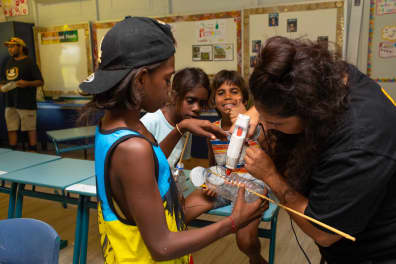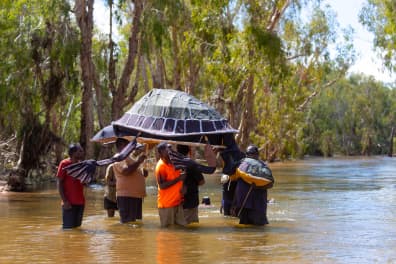Puppets for preservation
Puppets for preservation
13 April 2023
Public school life
Students at a remote Kimberley school helped spread the message about environmental sustainability in their community with a spectacular large-scale puppet production.
Wananami Remote Community School recently hosted the production, bringing together students, community members and two groups of local rangers, the Wunggurr and the Darran.gu.
Students at Wananami Remote Community School making the puppets.
The Big Country Puppet Project was a collaboration between the school, the rangers and Theatre Kimberley, telling the story of the ecological devastation being caused by local feral pigs, as well as the important work Indigenous rangers are doing to protect their local wetlands.
Feral pigs are an invasive species descended from domesticated pigs, and they create havoc in the Kimberley region waterways, destroying the native habitats of birds, reptiles and frogs, causing soil erosion, and carrying disease.
The large-scale and small-scale puppets were designed and built, and the performance was developed and rehearsed by students, staff and the rangers at the school over five weeks. It culminated in a spectacular twilight performance on Country, in and around the local wetlands the rangers work so hard to preserve.
The story followed Wulumara, the Ngarinyin word for longneck turtle, which is two metres long and built from recycled materials. It was operated by five people during the performance. Wulumara lays eggs at the watering hole and returns to the lily-laden waters while the ‘cheeky’ feral pigs or ‘piggy pigs’, played by junior school students, arrive at the watering hole and destroy the eggs. The story explores how the rangers trap the pigs and prevent damage to the waterhole and its other inhabitants.
Students used shadow puppetry and small and large masks and headpieces, to represent local wildlife, such as the spoonbill, brolga, black bream, and giant March flies.
The Wulagura Rangers, based on a Gibb River station over an hour away from the school, ran workshops with the children to teach them about their work, the importance of caring for Country and connecting community and culture.

Locals with the longneck turtle puppet.
The Indigenous rangers’ interactions with the community have left a lasting impression on the school students, with Principal Nikki Sandilands revealing many of the students are now saying they want to be rangers when they leave school.
“The program raised awareness of scientific and indigenous land management techniques utilised by the rangers to protect their land,” Ms Sandilands said. “We do a lot of two-way learning, we incorporate a lot of culture in our curriculum. This is an opportunity for the community to share their language and culture.
“Students and rangers alike were able to participate and build a new set of skills from the production of the performance, engage in learning the local language, and form relationships with the local elders and community through storytelling.”
Check out more photos on our Facebook.